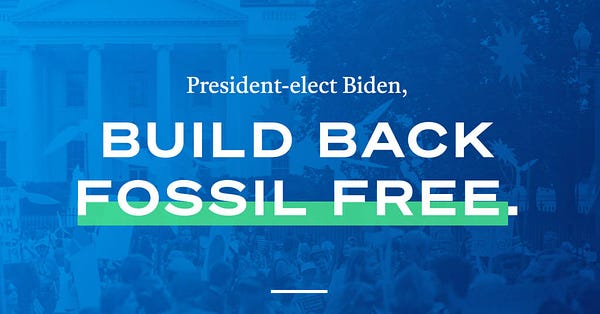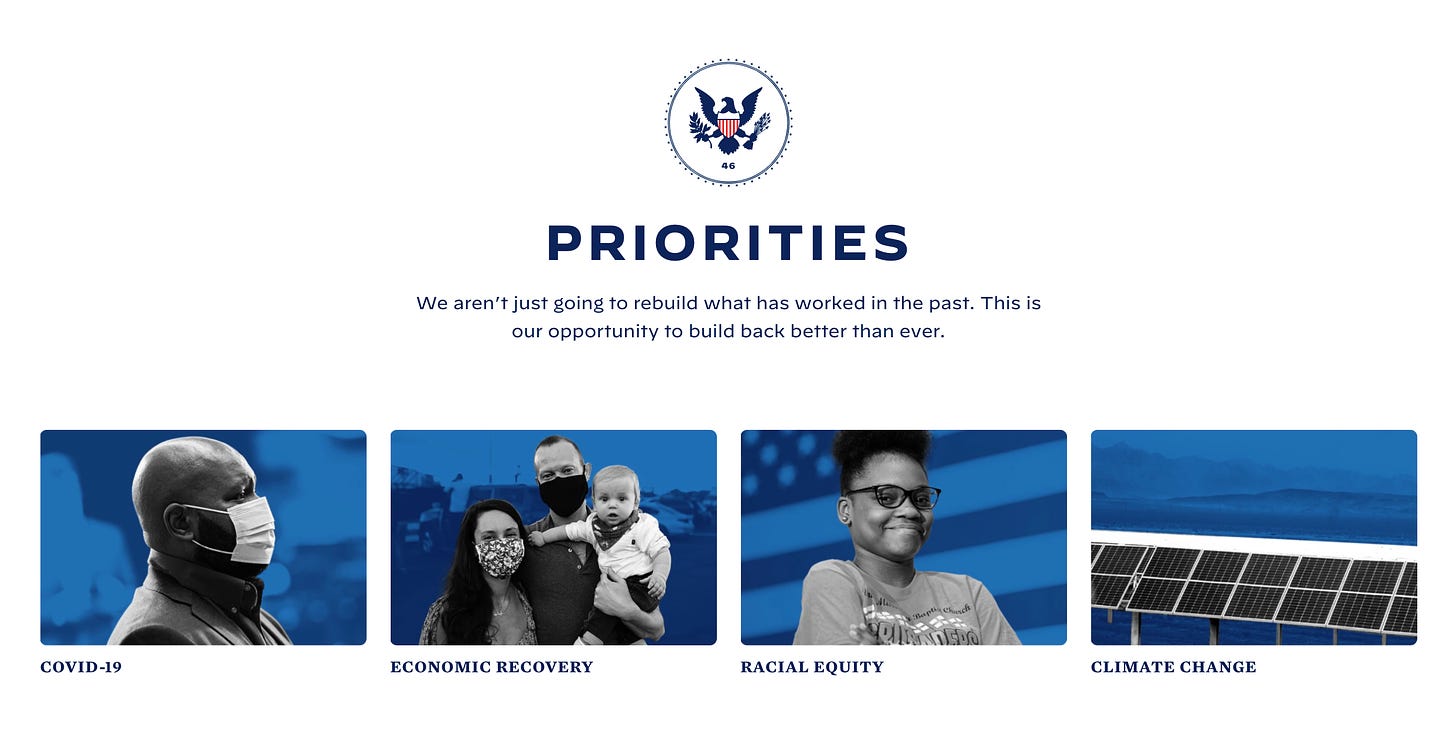https://thephoenix.substack.com/p/a-preview-of-the-biden-harris-presidency
President Biden has a climate mandate
By Eric Holthaus
This is the moment that climate advocates have been waiting decades for: A president who campaigned on climate change, is planning to make it a centerpiece of their governing strategy, at a moment when the stars are aligned in Congress and in the country for rapid progress.
Simply put: President Joe Biden’s first days in office will kick off the best chance we’ve ever had to make transformational changes throughout society at the scale necessary to avert catastrophic climate change.
The stakes could not be higher.
Climate change is the gravest existential threat our species has ever faced. Now, at last, we’ve got a chance for a society-wide mobilization to heal the harm that’s already been inflicted and steer humanity toward a better future that works for everyone.
We’ve finally got a real chance at this. And as someone who has been working on climate my entire adult life, it feels really, really good to say that.
Like the IPCC said, we’ll need transformational change in all aspects of society to get ourselves out of this mess, and establish what the Sunrise Movement calls the Decade of the Green New Deal.
…
Biden has embraced climate change as a primary mandate of his presidency, and in the weeks since the election has spoken repeatedly of an intersectional linking of climate justice and racial justice that will define his presidency.
In bold font right at the top of Biden’s transition website are the words: “We aren’t just going to rebuild what has worked in the past. This is our opportunity to build back better than ever.”
I’m turning 40 in a few days. I’ve been working on climate for half of my entire life. This is the first moment where I feel like everything is finally lining up for us to do what needs to be done, the way it needs to be done, in the time we have left.
We HAVE to make it count.
Day 1: Rejoin Paris & Stop Keystone XL
The first few days of Biden’s presidency will be focused on healing here at home and repairing our standing with the world. He’ll also be aiming to build trust within the climate community.
Biden’s Day 1 actions on climate are meant to reverse the worst of the Trump Administration’s harms as quickly as possible, and to send a signal to the rest of the world that America is more serious than we’ve ever been about owning up to our historical responsibility of creating the climate emergency.
Other Day 1 actions, like ending the Muslim travel ban and stopping the Keystone XL pipeline once and for all, are an even more explicit sign that Biden intends to side with the people who have done the least to cause climate change. Biden’s Chief of Staff Ron Klain, a friend of the climate movement and eerily prescient about the potential for climate change to help spawn public health crises, will be the one overseeing the coordination of the president’s day-to-day activities – another good sign.
Biden could (and should) go even further than the actions he has already announced: He could declare a climate emergency. That would send a signal that he’s prepared to embark on an all-out climate mobilization – just as his plans say he is.
 Climate Justice Alliance (CJA) @CJAOurPower
Climate Justice Alliance (CJA) @CJAOurPowerThere are 25 crucial executive actions @JoeBiden could take the moment he enters office to prevent #ClimateChaos, end #FossilFuel racism and improve well-being for millions of people. It’s time to #BuildBackFossilFree.  #BuildBackFossilFreeOur country is in crisis — President-elect Biden, it’s time to #BuildBackFossilFree.buildbackfossilfree.org
#BuildBackFossilFreeOur country is in crisis — President-elect Biden, it’s time to #BuildBackFossilFree.buildbackfossilfree.org
January 20th 2021
7 Retweets8 Likes
Rejoining Paris is a huge deal, not just because it reverses an egregious middle finger against the world, but because it obligates Biden to set a new near-term national emissions reduction goal – one that has the potential to be truly in line with a 1.5 degree world.
Once the US is back in Paris, it will be up to Biden’s entire climate team to determine the level of ambition the new target takes, which will drive the entire remainder of his presidency.
To live up to those new commitments, Biden intends to run the bureaucracy of the federal government in a different way. Biden’s whole of government approach to addressing climate ensures that addressing climate will no longer be a footnote – it will be central to the operations of the United States.
For example:
The Federal Reserve is now interested in managing climate risk as part of economic risk, a potentially massive influence on global fiscal policy.
As the Secretary of the Treasury, former Fed Chair Janet Yellen could set in motion a carbon tax and embrace decarbonization as a cornerstone of the economic recovery from the coronavirus-induced recession.
The new secretary of the Department of Health and Human Services, Xavier Becerra, could make historic changes toward justice for frontline communities that are bearing the greatest health risks and hazards from escalating natural disasters, like wildfires and flooding.
And having Deb Haaland at the Department of the Interior could be transformational.
 Deb Haaland @DebHaalandNM
Deb Haaland @DebHaalandNMDecember 18th 2020
38,419 Retweets337,676 Likes
And, of course, there are two new positions: Gina McCarthy leading domestic climate policy as the first-ever National Climate Advisor, and former Secretary of State John Kerry leading international climate negotiations means Biden’s team will out-wonk the fossil fuel industry at every turn.
Biden’s climate team is part of the most diverse cabinet in history, which means Biden will be listening to people of color, but hopefully in a non-tokenizing way. Progressives have criticized a few of Biden’s nominees, like Cedrick Richmond, for being too close to industry.
Biden will also have to navigate the tug of war in the Democratic party – over the aftermath of the Capitol attack, over whether or not to abolish the filibuster, over whether or not to continue to coddle climate deniers.
All of this hopefully will push the national conversation much further in the direction towards radical change. Candidates for Congress in closely contested elections who campaigned on a Green New Deal and Medicare for All tended to win their elections. Those who ran more moderate campaigns lost. Recent polling shows that a clear majority of Americans favor ambitious climate action – the kind that can only happen through an act of Congress. The American people seem to be speaking loud and clear: They are ready for big ideas.
Pushing for a big climate bill right away
Repairing Trump’s damage and rejoining Paris is just the start.
The election of Raphael Warnock and Jon Ossoff to the US Senate from Georgia gives the Biden Administration a trifecta – control of the White House, the Senate, and the House of Representatives – and should help make transformative climate legislation possible for the first time in US history.
Here’s what the bill is likely to look like:
There’s growing consensus even among swing Democrats that a huge multi-trillion dollar infrastructure bill is a good idea. The goal would be nothing less than to steer American society away from the fossil fuel era and towards a zero carbon economy.
By creating millions of jobs, by putting racial equity at the heart of every project, by literally repairing the wounds of the country, such a bill could help us leapfrog past the fossil fuel era for good.
…
To rise to the level of the Green New Deal, the bill would need Indigenous leadership and hold the voices of Black, Brown, disabled, queer, and other marginalized people at its core. It would need to include permanent housing and job guarantees, not just retrofits and temporary construction work. It would need to include comprehensive emergency management reform for an era of growing catastrophe, including defunding and demilitarizing police. It would need to take steps to hold the fossil fuel industry accountable for misleading the American public and getting us into this mess in the first place.
And most importantly – even before passing this climate bill – Congress will need to do everything it takes to pass structural reforms to repair and strengthen democracy so that white supremacists can no longer influence our government.
 Ayisha Siddiqa @AyishaSiddiqa12
Ayisha Siddiqa @AyishaSiddiqa12November 30th 2020
32 Retweets130 Likes
Changing the course of American history
If Biden can get a big climate bill through the Congress, he’ll then turn to setting a vision for the next few decades, and putting America on a path to eliminate fossil fuels entirely.
Biden’s new Paris target could commit the United States to reducing emissions by 50% or more this decade and net zero emissions by 2050 – in line with what the world as a whole needs to do to reach the 1.5 degree warming goal. As bold as that sounds, given the fact that the US is history’s leading emitter, net zero for us is not enough. We’ve got to do more, and we can.
 USCAN @uscan
USCAN @uscanDecember 4th 2020
2 Retweets4 Likes
…
All this is to say, a Green New Deal is possible with Biden as president. And if it’s possible, then we have the responsibility to fight for it.




